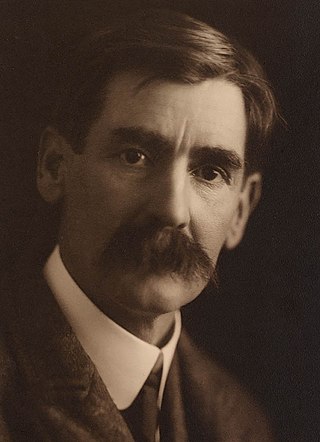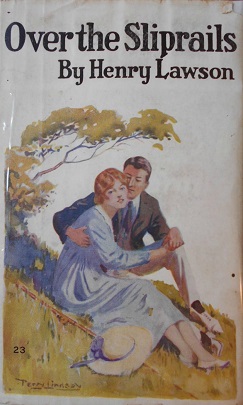Related Research Articles

Henry Archibald Hertzberg Lawson was an Australian writer and bush poet. Along with his contemporary Banjo Paterson, Lawson is among the best-known Australian poets and fiction writers of the colonial period and is often called Australia's "greatest short story writer".

Edward Vivian "Vance" Palmer was an Australian novelist, dramatist, essayist and critic.

Janet Gertrude "Nettie" Palmer was an Australian poet, essayist and Australia's leading literary critic of her day. She corresponded with women writers and collated the Centenary Gift Book which gathered together writing by Victorian women.
John "Jack" Mitchell, often referred to only as Mitchell, is a recurring fictional character in short stories and sketches by Australian writer Henry Lawson. He is widely considered one of Lawson's most memorable characters.
"The Union Buries Its Dead" is a well-known sketch story by iconic Australian writer and poet Henry Lawson. The story takes place in Bourke, and concerns the burial of an anonymous union labourer, who had drowned the previous day "while trying to swim some horses across a billabong of the Darling." The narrator, possibly Lawson himself, examines the level of respect the Bushfolk have for the dead, supplementing the story with his trademark dry, sardonic humour.
"A Double Buggy at Lahey's Creek" is a short story by Australian writer and poet Henry Lawson, first published in 1901. It was Lawson's second story to include the character of Joe Wilson; however, chronologically, it is fourth and final in the Joe Wilson series. The story recounts the events that befall Joe Wilson and his family, and which ultimately lead to his buying a double buggy for his wife, Mary.
"The Loaded Dog" is a humorous short story by the Australian writer Henry Lawson. The plot concerns three gold miners and their dog, and the farcical consequences of leaving a bomb cartridge unattended. The story was first published in the collection Joe Wilson and His Mates in 1901.
"On The Edge of a Plain" is a sketch story by Australian writer Henry Lawson, featuring his recurring character Jack Mitchell. The story was originally published in The Bulletin on 6 May 1893, and was collected in While the Billy Boils in 1896. It is considered among Lawson's best Mitchell stories.
A sketch story, literary sketch or simply sketch, is a piece of writing that is generally shorter than a short story, and contains very little, if any, plot. The genre was invented after the 16th century in England, as a result of increasing public interest in realistic depictions of "exotic" locales. The term was most popularly used in the late nineteenth century. As a literary work, it is also often referred to simply as the sketch.
Souvankham Thammavongsa is a Laotian Canadian poet and short story writer. In 2019, she won an O. Henry Award for her short story, "Slingshot", which was published in Harper's Magazine, and in 2020 her short story collection How to Pronounce Knife won the Giller Prize.
This article presents a list of the historical events and publications of Australian literature during 1901.
"Bell-Birds" is a poem by Australian writer Henry Kendall that was first published in The Sydney Morning Herald on 25 November 1867.
"The Drover's Wife" is a dramatic short story by the Australian writer Henry Lawson. It recounts the story of a woman left alone with her four children in an isolated hut in the outback in the late 19th century.
"The Chosen Vessel" is a dramatic short story by the Australian writer Barbara Baynton, first published in The Bulletin on 12 December 1896. It recounts the story of an outback woman left alone with her baby in a bush hut as she awaits attack by a swagman who has called there during the day.
"Where the Dead Men Lie" is a poem by Australian poet Barcroft Boake. It was first published in The Bulletin magazine on 19 December 1891, and later in the poet's poetry collection Where the Dead Men Lie, and Other Poems (1897).
Where the Pelican Builds is a poem by Australian poet Mary Hannay Foott. It was first published in The Bulletin magazine on 12 March 1881, and later in the poet's collection Where the Pelican Builds and Other Poems (1885).
The Wind at Your Door (1959) is a one-poem volume by Australian poet R. D. Fitzgerald. The poem was originally published in The Bulletin on 17 December 1958, and later in this 275 copy Talkarra Press limited edition, signed by the author. It won the Grace Leven Prize for Poetry in 1959.

Over the Sliprails (1900) is a collection of short stories by Australian poet and author Henry Lawson. It was released in hardback by Angus and Robertson in 1900, and features some of the author's lesser known stories.
Joe Wilson and His Mates (1901) is a collection of short stories by Australian poet and author Henry Lawson. It was released in hardback by William Blackwood in 1901 when Lawson was living in England, and features one of the author's better known stories in "The Loaded Dog".

While the Billy Boils is a collection of short stories by the Australian writer Henry Lawson, published by Angus and Robertson in 1896. It includes "The Drover's Wife", "On the Edge of a Plain", and "The Union Buries Its Dead".
References
- 1 2 3 4 5 The Penguin Henry Lawson Short Stories (first published 1986); with an introduction by John Barnes, Camberwell, Victoria: Penguin Books Australia, pp. 13, 224-5
- ↑ Lawson, Henry (1901) Joe Wilson and His Mates, Edinburgh and London: Blackwood.
- 1 2 Kerryn Goldsworthy (2000) "Fiction from 1900 to 1970." In: The Cambridge Companion to Australian Literature (ed. by Elizabeth Webby), Cambridge University Press: Cambridge, UK pp 105-133.